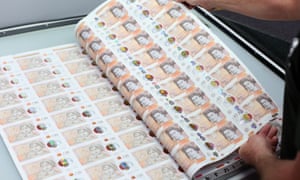Futures Forum: Positive money @ Radio 4 and Switzerland
And in Exeter:
Futures Forum: An Exeter Pound: the Positive Money campaign comes to Transition Exeter...
It's that 97%:
Futures Forum: An Exeter Pound: "97% Owned": Positive Money campaign film...
This is the Positive Money website:
Could These 3 Simple Changes to Banking Fix the Economy?
With thanks to the EDW blog who spotted this in the Observer:
“How the actual magic money tree works” | East Devon Watch
How the actual magic money tree works
85% of MPs were unaware that new money is created every time a bank extends a loan.
Were you?
Zoe Williams
@zoesqwilliams
Sun 29 Oct 2017
Comments 2,074
 A licence to print … 70% of MPs thought that only the government had the power to create new money. Photograph: Bank of England/PA
A licence to print … 70% of MPs thought that only the government had the power to create new money. Photograph: Bank of England/PAShock data shows that most MPs do not know how money is created. Responding to a survey commissioned by Positive Money just before the June election, 85% were unaware that new money was created every time a commercial bank extended a loan, while 70% thought that only the government had the power to create new money.
The results are only a shock if you didn’t see the last poll of MPs on exactly this topic, in 2014, revealing broadly the same level of ignorance. Indeed, the real shock is that MPs still, without embarrassment, answer surveys.
Yet almost all our hot-button political issues, from social security to housing, relate back to the meaning and creation of money; so if the people making those choices don’t have a clue, that isn’t without consequence.
How is money created? Some is created by the state, but usually in a financial emergency. For instance, the crash gave rise to quantitative easing – money pumped directly into the economy by the government. The vast majority of money (97%) comes into being when a commercial bank extends a loan. Meanwhile, 27% of bank lending goes to other financial corporations; 50% to mortgages (mainly on existing residential property); 8% to high-cost credit (including overdrafts and credit cards); and just 15% to non-financial corporates, that is, the productive economy.
What’s wrong with that? On the corporate financial side, bank-lending inflates asset prices, which concentrates wealth in the hands of the wealthy. On the mortgage side, house prices rise to meet the amount the lender is prepared to lend, rather than being moored to wages. The lender benefits enormously from larger mortgages and longer periods of indebtedness; the homeowner benefits slightly from a bigger asset, but obviously spends longer in debt servitude; the renter loses out completely.
Is there a magic money tree? All money comes from a magic tree, in the sense that money is spirited from thin air. There is no gold standard. Banks do not work to a money-multiplier model, where they extend loans as a multiple of the deposits they already hold. Money is created on faith alone, whether that is faith in ever-increasing housing prices or any other given investment. This does not mean that creation is risk-free: any government could create too much and spawn hyper-inflation. Any commercial bank could create too much and generate over-indebtedness in the private economy, which is what has happened. But it does mean that money has no innate value, it is simply a marker of trust between a lender and a borrower. So it is the ultimate democratic resource. The argument marshalled against social investment such as education, welfare and public services, that it is unaffordable because there is no magic money tree, is nonsensical. It all comes from the tree; the real question is, who is in charge of the tree?
What could we do instead? We could do QE for the people, overt monetary financing in which a government creates money for social benefit, such as green infrastructure or education. Or helicopter money, a central bank distributing it to everyone, either in a one-off citizen’s dividend or a regular citizen’s basic income. The nature of centrally created money should itself be opened up for debate, whose starting point is: if we agree that commercially created money is skewing the economy, can we then agree that it should be created by a public authority, even if we don’t yet know what that authority would look like.
How the actual magic money tree works | Global | The Guardian
.
.
.
No comments:
Post a Comment